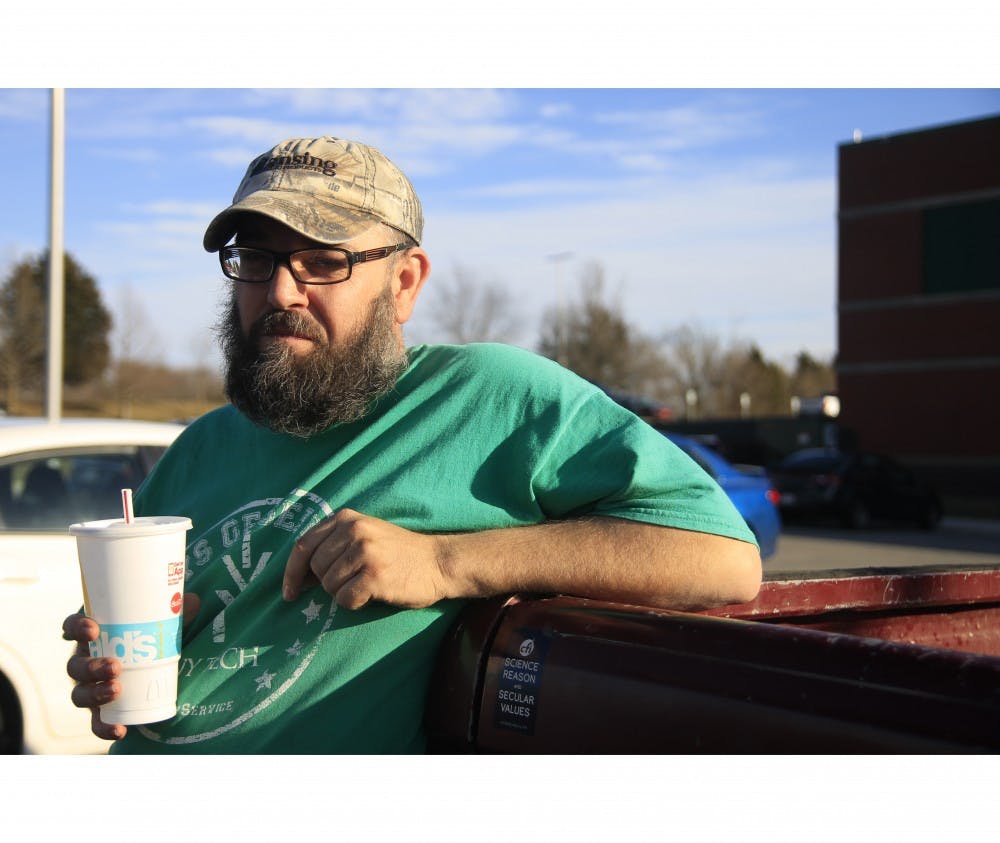Monday just before 9 p.m., James Mynatt has finished watching the news on his phone, set against the dash of his truck. Parked on a dead-end road on the west side of Bloomington, he’s settling down to sleep.
His jeans are bundled up under the steering wheel. He prefers to sleep in sweats, but he keeps his pants close so he can grab his billfold in the back pocket in case the cops come knocking on his window.
“What are you doing?” the officers ask him sometimes. “Does this truck belong to you?”
He wakes before sunrise to get to Ivy Tech Community College. Maybe he’ll grab breakfast on the way at McDonald’s, though he calls it Burger World. He’ll wash up there and be on campus when the doors open at 7 a.m. He doesn’t like to go to school in his sweats, so he’ll change in the restrooms near the lobby. Maybe into his favorite bib overalls.
***
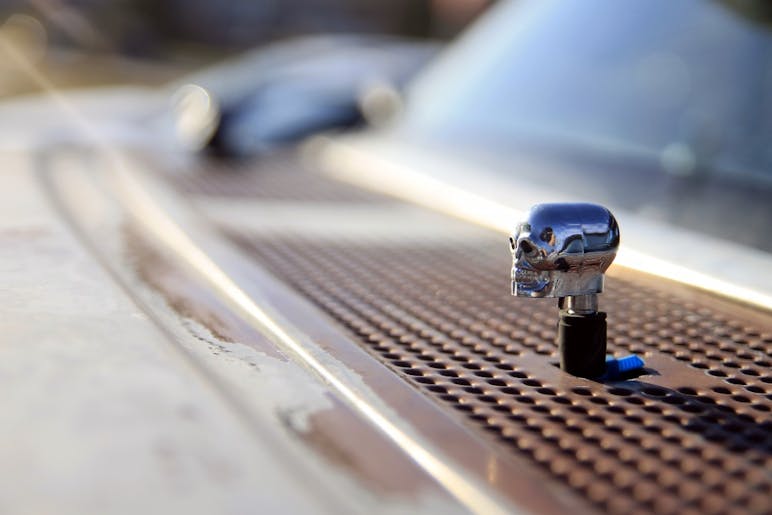
James is homeless, but he knows he has it better than most. He has an unpaid internship at the Shalom Community Center to help him finish his degree. He may not have a house, but he does have a place to sleep. He can pack food in his truck and leave it locked, so he can carry more gear with him.
He bought the 1992 Ford F150 with some cash a friend in California gave him when his other truck broke down. Now his truck is about 400 miles shy of 200,000. It’s maroon and primer gray, with rust scattered throughout, and equipped with what he calls the millennial anti-theft device – stick shift.
According to national studies, James is one of more than a million American community college students who are homeless. The Wisconsin HOPE Lab, a university lab working to find ways to make college more affordable, has surveyed community colleges around the country and estimates up to 14 percent of their students have no home.
“This study contributes to a growing body of evidence suggesting that basic needs insecurity is now a serious challenge in American higher education, and particularly in the nation’s community colleges,” the study reads. “Neither financial aid nor employment is a sufficient buffer to prevent students from going hungry or even homeless.”
James, 37, has not had a stable roof over his head since he lost his factory job in December 2010. That was the motivation he needed to decide to get his GED before moving on to college. He has played tug-of-war with the cost of school and the cost of housing ever since. School will always win. In his mind, it has to.
James has lived in poverty his entire life. His family moved six times between kindergarten and high school, rotating through shelters, trailer parks and relatives’ homes. His dad taught him how to fix everything, and his mom taught him how to love books. His favorite book was “Where the Red Fern Grows.” Billy, the novel’s main character, was a shit-talking 10-year-old, so James related to him.
He was way ahead of his peers in school because of his advanced reading habits. He never felt challenged by his coursework, often repeating material as he moved schools.
He loved tests, though. They were fun, and he completed them with ease. He frustrated his teachers by not doing the homework he felt was irrelevant to his education.
He ultimately dropped out of Mooresville High School his senior year because he had less than half of the credits he needed to graduate. He chose paid labor over doing his homework. He worked at a Foamcraft later on for four years, where he learned every job except two managerial positions. When he lost his job, he was living in a trailer park. He tried doing odd jobs but ultimately couldn’t afford rent and sold his trailer. Sleeping in his truck became his new normal.
[Take a look inside James’ truck in this photo gallery.]
His experience working long, monotonous hours at the factory inspired him to get his GED. He scored in the top 5 percent on the test, he says, and decided to continue his education at Ivy Tech. He graduated with his general education associate degree and will receive his human services associate degree in May.
James values knowledge and education and fears ignorance. He spends hours each week watching academics give talks on anything that catches his eye.
Oh, the polar bears are dying? Let’s look into that. Core samples? Embryology? Whole spectrums of topics are available to him on YouTube.
“I try to know a little bit about damn near everything because I feel like it makes me a more rounded person,” James says. “One of my most hated questions is, ‘What do I need to know that for?’ So you’re not ignorant, motherfucker. That’s why you need to know that.”
***
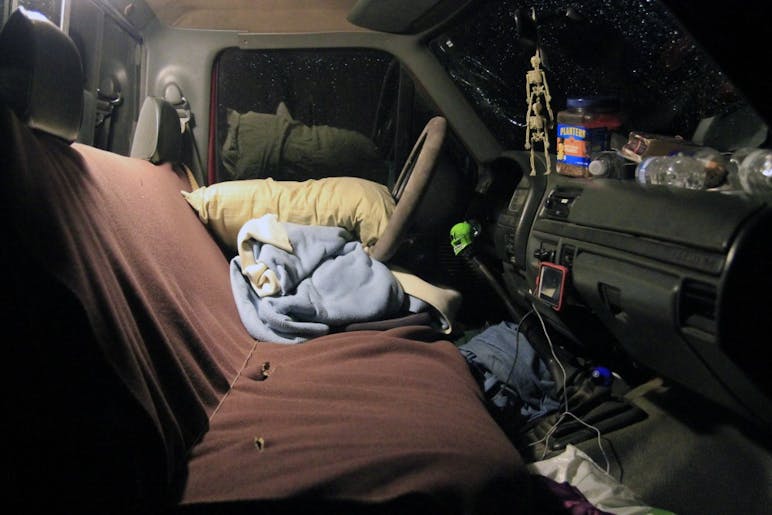
He’s slept in Walmart parking lots, Kmart parking lots and sometimes Menards when they turn their lights off at night. Now, though, he prefers parking his truck on the dead-end street. It’s secluded and has no streetlights around.
“Nobody comes back here,” James says. “Nobody fucks with anything. Nobody fucks with me.”
Cops have woken him up a few times in this same spot, though. He hands them his ID before they get a chance to ask for it. He said he knows how the game is played. It’s legal for him to park on a public road, but people ask why he doesn’t just park at Walmart.
“Have you ever slept in a Walmart parking lot?” James asks. “You should try it one day. No, seriously, you should try it one day. It’s not a pleasant experience because it’s so bright, and you’re sitting there trying to sleep and there’s fucking street lights when you open your eyes no matter which way you turn.”
So he sticks with his spot.
***
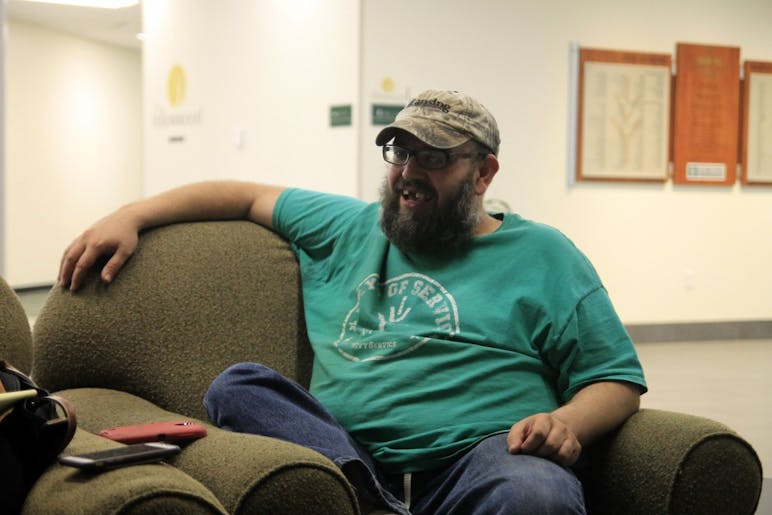
James is proud of his outgoing and spontaneous personality. Last semester, a professor was talking about health and nutrition in his human development class. She told her students they need to eat closer to the tree.
About a week later James took the time to fry some squirrel he killed on his buddy’s land along the White River with his single-shot 20-gauge shotgun. He placed his small frying pan on his Sterno single-burner folding stove and cooked outside in the school parking lot.
“Hey, I got a bunch of fried squirrel today I’m going to bring to class,” he said to his professor. “You said a couple weeks ago that we need to eat closer to the tree. Well, squirrels live in trees.”
“I’m going to tell my kids that joke,” his professor laughed.
“I’m not jokin,’” James said as he pulled out his Tupperware container filled with fried squirrel for the class.
James usually wears jeans, a T-shirt and his camouflage hat. Two of his front teeth are missing from years of not being able to afford a dentist, and his thick beard is starting to gray. He says he does things just a little bit differently than some of the students he goes to school with. He’ll tip his hat to women in the hallway. James says they have no idea how to respond. He was raised in the old way, he says, pre-internet. They barely had Atari back then.
“I go against the tide,” James says. “I never really wanted to be a sheeple.”
Whenever he meets people and they say something like, "Oh, it’s so nice to meet you," he’ll respond, "Yes, it really is. It really is nice to meet me." A stranger, in his opinion, is just a friend he hasn’t met yet. Everyone has potential.
***
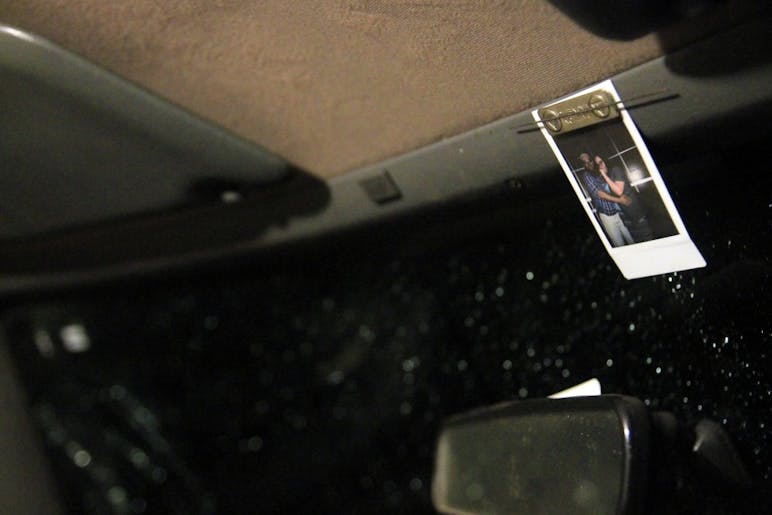
On a Monday afternoon in January, James is sitting in the Ivy Tech commons with his girlfriend of about a year, Erin Craig, and some other friends. They have a couple of couches off to the side where they usually congregate.
“I talk to so many people, they just kind of assume that I know everybody,” James says. “These my peoples.”
“When we first started dating, it was a joke that every second person that came around that corner, he knew,” Erin says. “I swear it was every second person. We literally got here five minutes ago, and there were two people here. Now all these people start coming out of the walls.” Erin has bright blue hair and sits next to James comfortably, occasionally grabbing his hand to hold.
“It’s like there’s a little announcement: James is two minutes away from campus, everyone get ready,” someone near them says.
James is a magnet for people who may not otherwise have a group to hang out with in the commons. It’s one of his personal goals to make sure everyone in the room feels they can have a conversation with him.
It takes him so long to walk from one side of the room to the other because so many people will talk to him. He’ll go to the library grab to something quick and emerge over an hour later because he gets into an interesting conversation.
“You know how guys don’t talk to each other in the bathroom?” Erin asks. “He gets stuck talking to guys in the bathroom, that’s how much he talks to people.”
James suddenly stands up, leaves and emerges a few minutes later with three boxes of Thin Mints. He hands them to his female friends sitting close by and they gush.
“Don’t cry over Girl Scout cookies. I do this for Valentine’s Day almost every year,” James says as he passes the boxes out. “I get a bunch of the girls Girl Scout cookies.”
“Isn’t Valentine's next month?” a passerby asks.
“Yeah, but hey, it’s never too early to give a girl chocolate, OK,” James says. “Never.”
“He makes a lot of my female friends jealous because he’s got a lot of good one-liners like that,” Erin beams at his thoughtfulness, one of the constants in their relationship. She is 20 and confident James won’t live in his truck forever. They could maybe get a tiny house together in a few years.
Sometimes Erin goes to the spot James parks his truck with him. They walk around the grassy areas surrounding it. She thinks a garden and a play set would look nice on either side of the space he parks his truck. She pictures a development of small houses sprouting up and a future together outside the truck.
Erin met James her first day at Ivy Tech. She sat at a table in the commons with some friends from high school. They were the new kids, just trying to find their place. James sensed their discomfort and walked up to them, offering up the package of cookies he was working his way through.
No, thank you, she said. You’re always told to not take food from strangers, especially not already-opened packages. He left the cookies on the table and walked away. To this day James doesn’t remember the interaction, but it stood out to Erin in detail.
Two months went by when Erin overheard James’ familiar voice in the commons.
“What do you mean EvilBible.com is blocked? It’s a religious resource, and my friend is sitting next to me watching porn!”
His booming voice meant business. He got off the phone and sat down, pissed the conversation was a dead end.
Erin walked over, and asked if she could join him. They sat and talked for hours until Erin’s ride picked her up. It wasn’t until later in their relationship James learned it was her mom who walked over to the pair to pick up Erin. When she saw her daughter talking to James, she waited in the car.
The couple’s future is unclear, but he hopes they last. They talk about marriage and if they want kids, but more pressing on his mind is finishing his degree.
He chose not to take on a part-time job to devote more time to his internship the the Shalom Center. Odd jobs on the weekends will have to supplement his loans for school. He hopes his degree puts him on a path to making it.
Making it is not having to worry about spending $20 on oil when he needs to change it. Making it is having a small house on a big property with plenty of room for squirrel hunting.
Making it is using his degree to help homeless people like him coordinate work and places to live so they can make it, too.
***
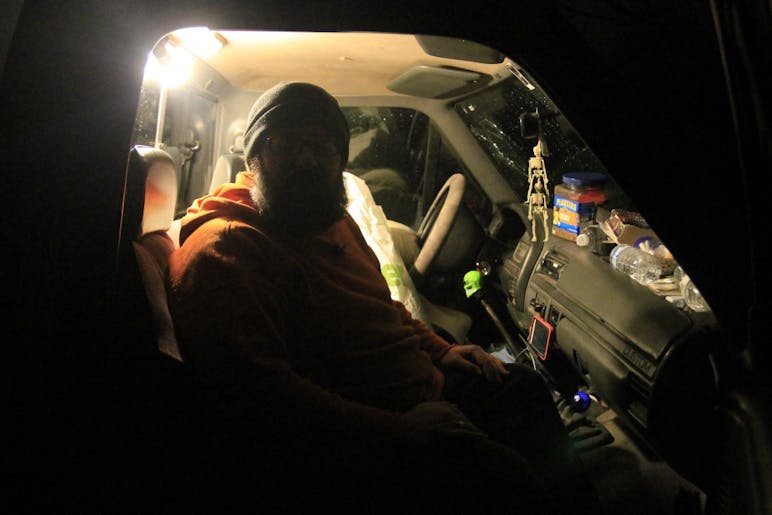
James rearranges everything in the front seat of his truck to get ready to go to sleep. It’s raining, so he makes sure his plastic totes with clean clothes are secured in the back. He throws his backpack on the driver’s floorboard, puts his pillow on the passenger side and grabs his extra wool blanket.
If he were just a little shorter, he’d be able to lay down in the cab more comfortably. For now, he lays his head on the passenger seat. In May, he’ll graduate and find a job advocating for other homeless people.
Sleeping in the truck is only temporary.

